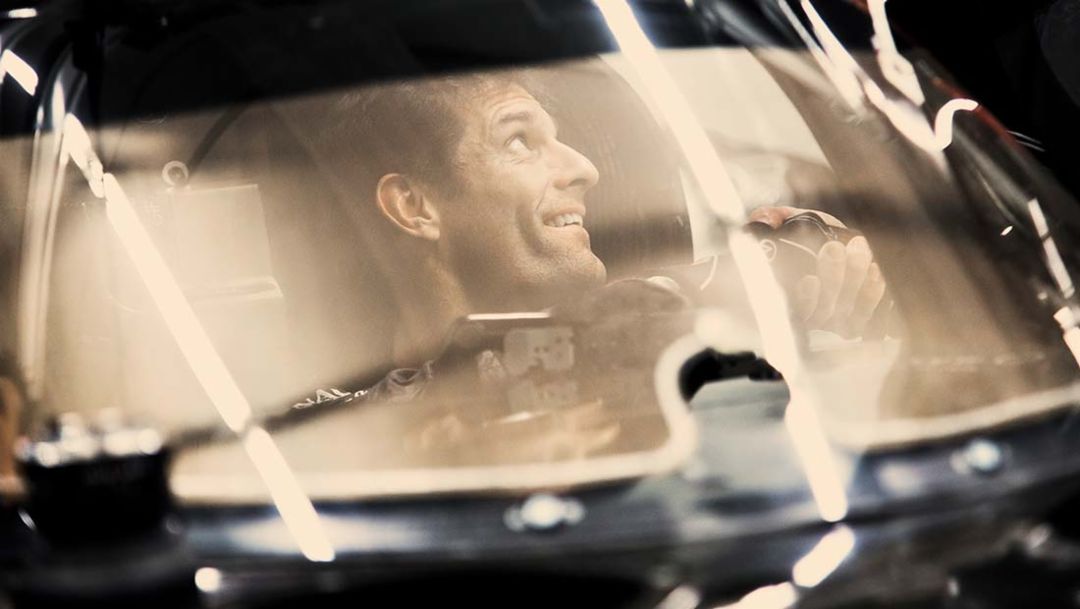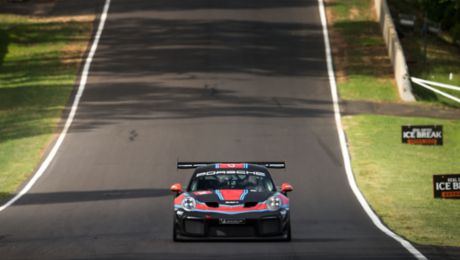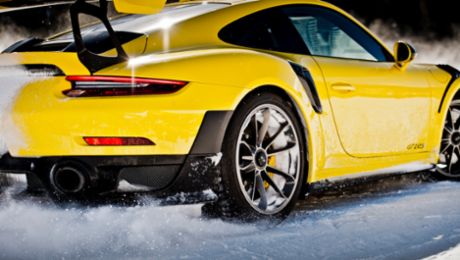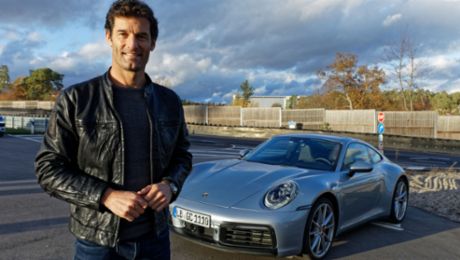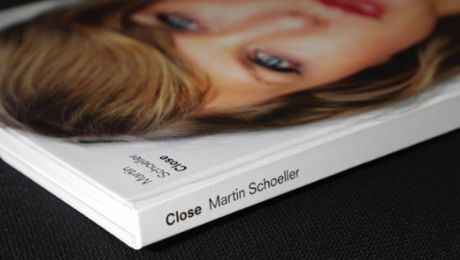Off to New Horizons
Mark Webber – the fit, chiseled, uncompromising Grand Prix winner. We caught up with the Porsche factory driver during a pit stop at his personal fueling station in Noosa Heads, Queensland, Australia.
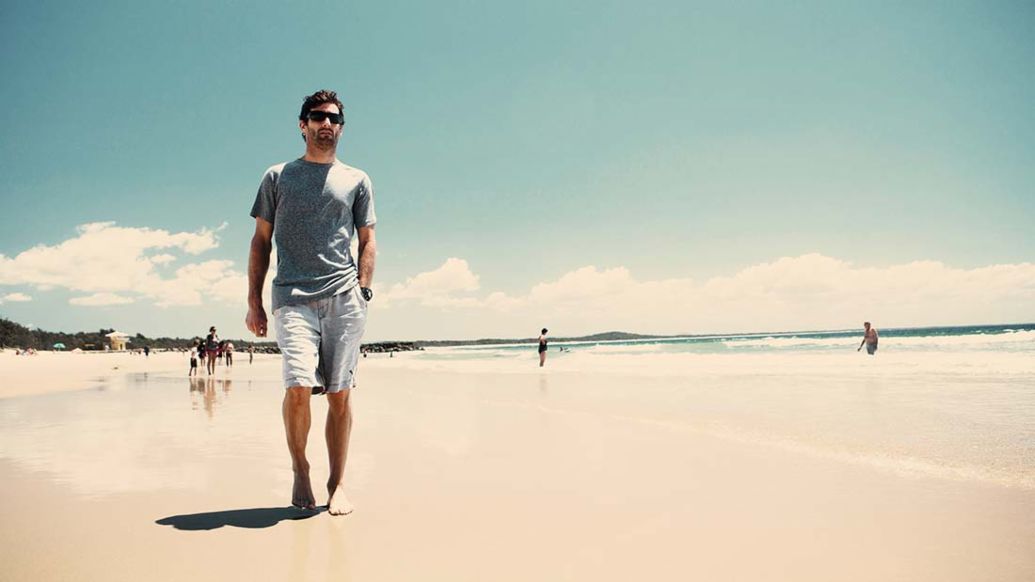
An impressive record of 217 Formula One races, 13 pole positions, nine victories. Mark Webber has never missed a race. Never backed down from a challenge. And never expected to return to Le Mans—but “to go back with Porsche was too good to resist.”
He stands on his balcony and stares out to sea along one of the most beautiful stretches of the Australian coastline. The atmosphere speaks for itself, but he puts it into words: “I just love how picturesque it is. I love the coast, the sea, the subtlety of the vegetation, the beaches, the sensation of being on the very edge of the continent.” At 37 years old, Webber enjoys it but doesn’t take anything for granted. When he talks about his life, there remains quite a bit of bewilderment at how far he has come.
If you’ve entered a race despite suffering from food poisoning, or walked to the starting line without crutches despite a leg that is still broken, you’re either crazy or more than a little tough and strong-willed. Mark Webber is not the least bit crazy.
He secured a test-drive with the Benetton F1 team, thanks partly to Ann Neal
Except perhaps when it comes to racing. He left his hometown of Queanbeyan, near Australia’s capital Canberra, for England at the age of 19 with the resolute aim of making his mark in racing. He was one of many, and he brought no money or big ticket sponsors. What he had, though, was an uncommon tenaciousness and an ironclad belief that he had the right stuff. He took victory at the prestigious Formula Ford Festival in Brands Hatch, and took part in a sports-car project with Mercedes.
The climax of the 1999 season should have been the 24 Hours of Le Mans, where both his car and his team were considered favorites. But an aerodynamic quirk sent the Mercedes into a terrifying backflip and barrel roll at more than 300 km/h. First in the qualifying and then again in the warm-up, Webber’s car literally flew before landing on its roof. It was a miracle he walked away. Although he survived these horrific crashes, the momentum in his career was gone. Things slowly turned around, however, and he secured a test-drive with the Benetton F1 team, thanks partly to Ann Neal, the Englishwoman who has been his partner, confidante, and manager behind the scenes for 17 years. Webber says he wouldn’t be where he is without her, and their struggles and successes have been a team effort.
At his Formula One debut in 2002 he lined up at the Australian Grand Prix in Melbourne with the modestly funded Minardi team and surprised everyone by finishing fifth. He ascended the podium for the first time in 2005 with the BMW Williams team. And his first victory came in 2009 in Germany with Red Bull Racing, after 131 Grand Prix races. In 2010 and 2012 he won the Monaco Grand Prix, one of the contests where victory can catapult you into the racing hall of fame. Another is the 24 Hours of Le Mans—where he’s had a score to settle since 1999. And that’s what he wants to do with Porsche.
He has everything it takes. The speed, the experience, the fitness, the guts, and, even more important, the team spirit. For the eight races in the 2014 World Endurance Championship (WEC) that climax in Le Mans, Webber will share the car with two teammates. “There are plenty of handy sports-car drivers in the world—especially on the Porsche LMP1 team,” he notes. “That will be a challenge for me, and I’m under no illusions that I’m just going to roll in there.”
The things he prizes most in a teammate are skill, composure, and an ability to give and take criticism. “I’ll be listening to what they’ve got to tell me on certain factors for sure. As for me? If I can help them, I’ll be doing it.”
So much about the new challenge has him excited: the endurance element, the teamwork, the precision, pace, and technology. “The cars are the closest to F1 in terms of performance and feeling and adrenaline,” he says. As far as the technology goes, the new efficiency regulations lend an even greater degree of complexity to the top category of Le Mans prototypes.
Sitting at a beachside café in Noosa Heads, Webber seems keen, as always, to talk about his long-term love affair with Porsche road cars. It started when he borrowed a friend’s 911 as a teenager. The first he owned was a 2009 997-series Turbo. He now has a GT2 RS, and his most prized car of all is a GT3 RS. This is the four-liter model, one of only six hundred made. “I love how Porsche managed to slowly massage that 911 shape without buckling to anything extravagant. A 911 isn’t pretentious. You can take it to most places. That’s what I love about it, because under the skin the performance is off the charts. Then there’s the seating position—you’re low, with a slightly high steering wheel …” His enthusiasm is such that he grips an imaginary wheel above his fruit juice. “There is a lot of race car in a 911.”
Webber loads his mountain bike into a Cayenne GTS
A few “fluoros”—the affectionate local name for construction workers in their high-visibility vests—walk past and smile. “Go Mark! Good luck!” He returns their smiles, waves, and returns to the subject. “The brakes! The 911 stops on a dime. It is functional, reliable, light. You can go for long trips and won’t get out feeling like you are busted in half. Ann and I have some good road trips planned this year, for example over the Alps.” Then he talks about the 918 Spyder, which he regularly encounters on visits to the Porsche Development Center in Weissach (“What a weapon!”).
The chat is over. Webber loads his mountain bike into a Cayenne GTS. Noosa is the perfect place for him to both wind down and train. The awesome weather, the surf, and bush trails for paddling, running, and mountain biking. He follows a strict, well thought-out fitness program in order to prepare himself in the best possible way for the new challenge with Porsche. He sees a number of new developments arising from the new technical regulations for the WEC. “Porsche is breaking new ground with this racing car, with developments that will later appear in road cars,” he observes.
He is well aware of the resources that have been invested, and also of the expectations. But his attitude is realistic. “It’s a new challenge, and the bar is high; the competitors are all big players. People expect a lot from us, and that is right because of the history that has gone before. But just because it has a Porsche badge on it doesn’t mean we are going to turn up and blow everyone away. We are going to have to work very, very, very hard.”
Info
Text first published in the Porsche customer magazine Christophorus, Nr. 365
Consumption Data
911 (Type 991): Combined fuel consumption: 9.0 – 8.2 l/100 km; CO₂ emission: 211 – 191 g/km
Cayenne GTS: Combined fuel consumption 10.7 l/100 km; CO₂ emission: 251 g/km
918 Spyder: Combined fuel consumption 3.1 – 3.0 l/100 km; CO₂ emission: 72-70 g/km; Electricity consumption 12.7 kWh/100 km
918 Spyder (Weissach package): Combined fuel consumption 3.1 – 3.0 l/100 km; CO₂ emission: 72-70 g/km; Electricity consumption 12.7 kWh/100 km
